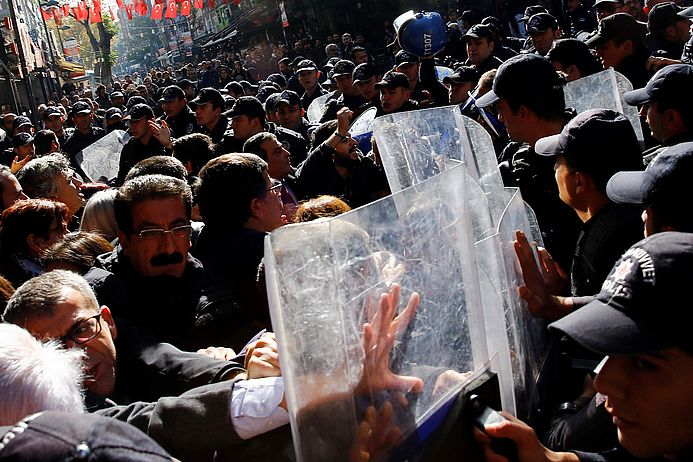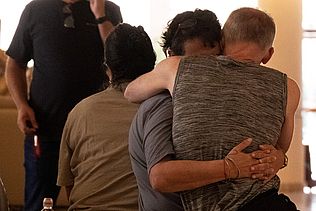There are no longer just a few authoritarian regimes moving against NGOs, human rights defenders and other civil society actors. Civicus, the World Alliance for Citizen Participation, noted in 2016 that the space for emancipatory politics has been eroded in four out of five countries worldwide. In recent years explicit anti-NGO legislation has been passed in 60 countries which threatens the freedom of organisation of NGOs. The law is being used to cut off domestic organisations from international networks and foreign funding.
The NGO laws themselves are just the most obvious form of state repression, which ranges from bureaucratic restrictions through smear campaigns and censorship to open suppression by security forces. The actors being persecuted are not just those calling for respect for civil rights and freedoms but include those pressing for realisation of economic, social and cultural rights. Anyone fighting for land rights in Honduras or against socially and environmentally unacceptable extractive industry projects in Ethiopia is facing danger to life and limb.
The watchword “shrinking spaces” raises questions of the current relationship between freedoms and state force. An adequate definition of “civil society” must transcend the level of the nation state, and must also reflect the conflicts of interest that can arise between social actors and between NGOs. Who is given what space is an instrument of state management.
The medico international textile campaign attempts to match the complexity of the action in “shrinking spaces”. The space being fought for here is entirely concrete in one respect: a house of their own for unionisation of the seamstresses in the centre of Karachi, for better working conditions, acceptable safety at work and an adequate wage. At the same time, the lawsuit against KiK also opens up the space to Germany and into the European Union. Four plaintiffs are demanding compensation as proxies for all those involved in the factory fire. A favourable verdict would create a precedent with far-reaching consequences. German companies would not be able to avoid their responsibilities, including designing appropriate factory premises worldwide.
Marcus Balzereit
How the work of medico partners is being obstructed – four examples.
Turkey
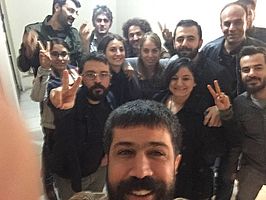
In Turkey, there was nothing gradual about the shrinkage of democratic spaces in 2016 – they were dramatically collapsed. The attempted coup in summer gave the regime in Ankara a new excuse to shut down inconvenient forces in central areas of society. Tens of thousands were imprisoned or forced from office, press freedom was virtually abolished, members of parliament were jailed and opposition mayors removed. In November, there was the blow against an independent civil society. Some 370 civil rights foundations, child protection associations, women’s associations, cultural and citizen initiatives of all kinds were banned, including two medico partners, the Rojava Aid and Solidarity Association and the Mesopotamian Lawyers Association. They had already been coping with harassments, accounts blocked, employees arrested and food supplies confiscated. The ban is a strategic move, hitting two organisations which oppose the Turkish army’s war on Kurdish self-government in the south-east of the country. The Rojava association also supplies humanitarian aid to the citizens of the Kurdish cities who have been bombed out and exiled. The Lawyers Association has filed over 600 complaints against the destruction and confiscation of houses and properties. Seen in this light, the ban is a move to gag those who are helping publicise the domestic war and human rights violations.
Egypt
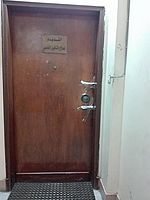
In February 2017, a photo of a barred door was again shown on medico’s home page. This time, it was for the El Nadeem Centre in Cairo’s city centre, the best-known treatment centre for the country’s victims of state and domestic violence. It has been providing direct psychological and legal assistance since 1993. Regardless of the political shifts in power in Egypt in recent years, the centre has unambiguously opposed all state, military and police violence against civilians. At the start of 2016 El Nadeem published an annual report – an “archive of oppression” – on the growing number of cases of torture to mark the anniversary of the 2011 uprising in the Arab Spring, and the ministries of health and the interior tried to close the centre. El Nadeem appealed the order, and carried on working. At the start of 2017, when the centre again reported on extra-legal killings, mistreatment and torture of prisoners in police stations and prisons, the police sealed the premises and banned all further activities – activities which are more important than ever in the struggle to regain the freedoms won in 2011.
Israel
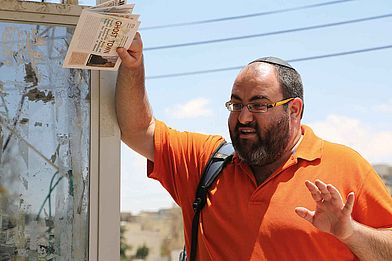
At the end of 2015, the Israeli Cabinet approved a law imposing stricter regulation of the work of civil rights groups funded from abroad. This is another state action against domestic voices critical of the occupation or the government. At the same time, there has been an increase on a broad front in attacks, smears and extensive obstacles to the work of NGOs. These also affect medico partners such as Physicians for Human Rights – Israel, the Who Profits initiative, and above all Breaking Silence, a veterans’ organisation critical of the occupation. The latter was massively attacked by Jewish nationalist organisations, and by right-wing politicians. Undercover agents infiltrated for months of spying and attempting to provoke a shutdown of Breaking the Silence. The names and addresses of all the staff were publicised in the social media. The silence of the occupation should not be disturbed. “For 49 years we’ve imposed a military dictatorship in the occupied territories,” says Yehuda Shaul of Breaking the Silence. “Could we seriously have imagined that we could keep this situation on the far side of the Green Line and still hold on to democracy on our side?”
Guatemala
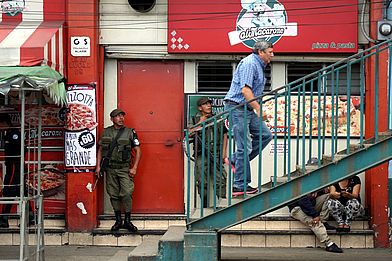
In recent years, the Guatemalan judicial system in cooperation with the International Commission against Impunity in Guatemala (CICIG) has struck some startling blows against the country’s corrupt oligarchy. medico partners also prepared the path to greater justice in the country. The organisation ECAP has devoted itself for decades to psychosocial work in the context of reappraising and investigating the dictatorship, and in this context also supported the lawsuits. Among other causes, the human rights lawyers of the Bufete de Derechos Humanos and the International Commission of Jurists (CIJ) were involved in the conviction of ex-dictator Rios Montt for genocide and the punishment of the former military for abducting and enslaving women from the village of Sepur Zarco. Since then, however, medico partners have themselves become targets of an increasingly aggressive right wing, as a result of their defence of indigenous communities against large-scale projects, and their involvement in the Creompaz case, in which high-ranking military are charged with the violent disappearance of 558 people. Threats and charges against the lawyers Ramón Cadena (CIJ) and Michael Mörth (Bufete, CIJ) of “engaging in a criminal conspiracy” were followed by a search of Cadena’s house in Guatemala City. Documents were reviewed, and a laptop and cellphones were stolen. Other valuables remained unaffected.
Christian Sälzer

